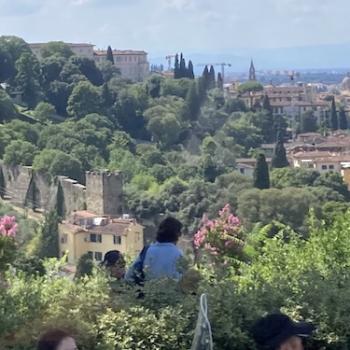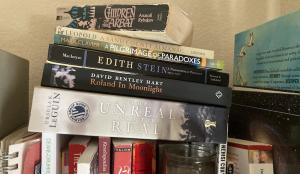
“Our great mystery is in danger of being made a thing of little moment.” -Gregory of Nazianzus
One of the pivotal moments in the history of theology comes in 381, from a villa in Constantinople. There, at the heart of the empire, the long battle for the Nicene faith had come to a head. Within a few months the second great Ecumenical Council would gather. Gregory of Nazianzus had a unique opportunity to lay the case for the Incarnate God before the masses. It seemed a moment for clarity and purpose, with so much hanging in the balance. That makes it all the more remarkable, to me, that Gregory opens his orations by invoking the mystery of God.
The Theologian in the City
According to an excellent biography, Gregory of Nazianzus was there following through on a dying wish of his friend Basil. The nearly sixty years since the Council of Nicaea had been a roller coaster for the newly legalized churches. The key question continued to be the identity of Jesus. Was he divine? Nearly divine? Or a creature, totally separate in essence from God? Liturgies and catechisms changed nearly as often as bishops.
Conscious of the inhospitable environment this created for a life of faith, Basil had the idea of a preaching campaign. If a skilled orator could lay the case before the people, perhaps a faith could grow irrespective of the political weather. He saw the possibility of a hope in the divinity of Christ catching on among hoi polloi in the capital. And he wanted his old friend Gregory to be the preacher.
The city offered Gregory a villa for his residence, and he immediately turned it into an outdoor chapel. He called it Anastasia, “Resurrection,” as a way of signifying his dream of bringing the dying Nicene tradition back to life. His orations were powerful, and they make plenty of assertions. They lay out a case for a Christ who can speak both as a fully human companion and as identical in essence to the Father. They conclude with the innovative insistence that the Spirit is also of the same essence as the Father and Son. This last move was anticipated by Basil. Still, it was a bold new way of speaking of God’s presence among us after the Ascension.
Getting Ready to Rumble
But Gregory doesn’t open his orations with those assertions. He names the conflict not, first, as one about the right way of speaking of the Incarnation. Instead, he says that “our great mystery is in danger of being made a thing of little moment.” He compares the theologians of the day to athletes in what sounds remarkably like a WWE of the ancient world. They are like wrestlers who forgo honest grappling in order to entertain by deception.
Again, the mystery he is trying to safeguard is the mystery of a God who dwells among us, first as Jesus and then as the Spirit. It matters a great deal to Gregory that we speak well of these divine companions. But he wants those crowds gathered in his open air nave to know, first, that getting the formula right isn’t the point. He’s hoping that the days of basing the faith of churches on the next episcopal proclamation are over.
There’s a pretty remarkable faith underlying that strategy. If it truly is the mysterious God who dwelt among us in Jesus, and who dwells among us now in the Spirit, then formulas can only ever be approximations. Before we discuss the appropriateness of the iota (i) in the Creed, we need to do some soul-searching. Are we engaging in theology like it’s “pleasant gossip,” best done through “idle jests and petty contradictions?” Or is our intention to carefully craft our faith language so that it can bring supernatural hope to a suffering creation?
The Mystery and the Mistakes
Any honest attempt to do the latter, Gregory thinks, is a good place to start. And he really does seem to mean this. John’s Gospel tells us there are many mansions in heaven, he reminds the Constantinopolitan crowd. And if Matthew says the road there is singular and narrow, we should not hear in this that our theological convictions ought to be uniform. Rather, the Spirit of our baptism is one and distinct, and can make one narrow path of the various routes to these many mansions.
Again: are we trying to tell the truth about God? That’s the only good beginning to theology. We may be babbling, but couldn’t a divine Spirit interpret all our words, to the Father’s ear, as the only-begotten Word?
Gregory ends this first of his orations in the city by reiterating his thesis in even clearer terms.
To hit the mark is not useless, and to miss it is not dangerous. With God we shall have converse in this life only in small degree; but a little later, it may be, more perfectly…
The point of theology is conversation with God. You can see where he’s going to take this: if that’s the point of theology, then all the more reason to say that it’s God we are conversing with in Christ and the Spirit.
But that’s for later. Now he wants us to know that theological errors, just like successes, are welcome. We’re all only ever failing, in the power of the Spirit, to speak of the Word with our human voices. Good theology marks this mystery. Sometimes by saying things well, more often by our glorious failures.











